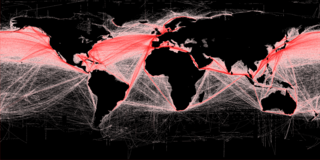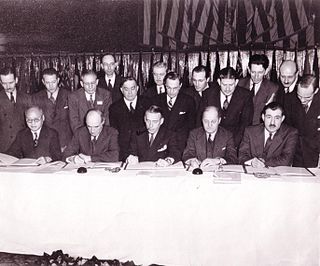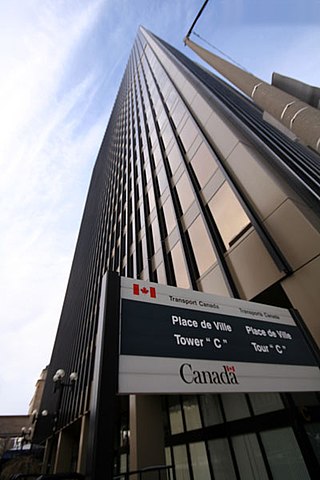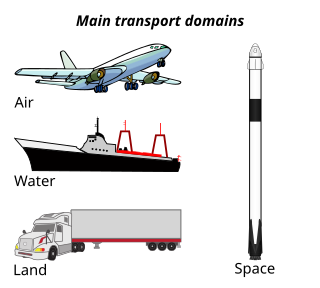There are a number of systems of transport in the Comoros. The Comoros possesses 880 km (547 mi) of road, of which 673 km (418 mi) are paved. It has three seaports: Fomboni, Moroni and Moutsamoudou, but does not have a merchant marine, and no longer has any railway network. It has four airports, all with paved runways, one with runways over 2,438 m (7,999 ft) long, with the others having runways shorter than 1,523 m (4,997 ft).

Freight transport, also referred to as freight forwarding, is the physical process of transporting commodities and merchandise goods and cargo. The term shipping originally referred to transport by sea but in American English, it has been extended to refer to transport by land or air as well. "Logistics", a term borrowed from the military environment, is also used in the same sense.

A train is a series of connected vehicles that run along a railway track and transport people or freight. Trains are typically pulled or pushed by locomotives, though some are self-propelled, such as multiple units or railcars. Passengers and cargo are carried in railroad cars, also known as wagons or carriages. Trains are designed to a certain gauge, or distance between rails. Most trains operate on steel tracks with steel wheels, the low friction of which makes them more efficient than other forms of transport.
The Incoterms or International Commercial Terms are a series of pre-defined commercial terms published by the International Chamber of Commerce (ICC) relating to international commercial law. Incoterms define the responsibilities of exporters and importers in the arrangement of shipments and the transfer of liability involved at various stages of the transaction. They are widely used in international commercial transactions or procurement processes and their use is encouraged by trade councils, courts and international lawyers. A series of three-letter trade terms related to common contractual sales practices, the Incoterms rules are intended primarily to clearly communicate the tasks, costs, and risks associated with the global or international transportation and delivery of goods. Incoterms inform sales contracts defining respective obligations, costs, and risks involved in the delivery of goods from the seller to the buyer, but they do not themselves conclude a contract, determine the price payable, currency or credit terms, govern contract law or define where title to goods transfers.
Transport aircraft is a broad category of aircraft that includes:

In transportation, freight refers to goods conveyed by land, water or air, while cargo refers specifically to freight when conveyed via water or air. In economics, freight refers to goods transported at a freight rate for commercial gain. The term cargo is also used in case of goods in the cold-chain, because the perishable inventory is always in transit towards a final end-use, even when it is held in cold storage or other similar climate-controlled facilities, including warehouses.

A merchant ship, merchant vessel, trading vessel, or merchantman is a watercraft that transports cargo or carries passengers for hire. This is in contrast to pleasure craft, which are used for personal recreation, and naval ships, which are used for military purposes.

The Convention on International Civil Aviation, also known as the Chicago Convention, established the International Civil Aviation Organization (ICAO), a specialized agency of the United Nations charged with coordinating international air travel. The Convention establishes rules of airspace, aircraft registration and safety, security, and sustainability, and details the rights of the signatories in relation to air travel. The convention also contains provisions pertaining to taxation.

ISO 6346 is an international standard covering the coding, identification and marking of intermodal (shipping) containers used within containerized intermodal freight transport by the International Organization for Standardization (ISO). The standard establishes a visual identification system for every container that includes a unique serial number, the owner, a country code, a size, type and equipment category as well as any operational marks. The register of container owners is managed by the International Container Bureau (BIC).

Transport Canada is the department within the Government of Canada responsible for developing regulations, policies and services of road, rail, marine and air transportation in Canada. It is part of the Transportation, Infrastructure and Communities (TIC) portfolio. The current Minister of Transport is Pablo Rodriguez. Transport Canada is headquartered in Ottawa, Ontario.
The government of Zimbabwe is the main provider of air, rail and road services; historically, there has been little participation of private investors in transport infrastructure.

Rail freight transport is the use of railways and trains to transport cargo as opposed to human passengers.
A mode of transport is a method or way of travelling, or of transporting people or cargo. The different modes of transport include air, water, and land transport, which includes rails or railways, road and off-road transport. Other modes of transport also exist, including pipelines, cable transport, and space transport. Human-powered transport and animal-powered transport are sometimes regarded as distinct modes, but they may lie in other categories such as land or water transport.
A freight forwarder or forwarding agent is a person or a company who co-ordinates and organizes the movement of shipments on behalf of a shipper by liaising with carriers. The carriers may use a variety of shipping modes, including ships, airplanes, trucks, and railroads, and often use multiple modes for a single shipment. A freight forwarder does not move the goods but acts as an agent in the logistics network and will carry out freight consolidation, rate negotiations, shipment tracking, customs and other documentation, among other tasks. FIATA describes a freight forwarder as the "Architect of transport".
An air waybill (AWB) or air consignment note is a receipt issued by an international airline for goods and an evidence of the contract of carriage. It is not a document of title to the goods. The air waybill is non-negotiable.

A transport hub is a place where passengers and cargo are exchanged between vehicles and/or between transport modes. Public transport hubs include railway stations, rapid transit stations, bus stops, tram stops, airports, and ferry slips. Freight hubs include classification yards, airports, seaports, and truck terminals, or combinations of these. For private transport by car, the parking lot functions as an unimodal hub.
Document automation is the design of systems and workflows that assist in the creation of electronic documents. These include logic-based systems that use segments of pre-existing text and/or data to assemble a new document. This process is increasingly used within certain industries to assemble legal documents, contracts and letters. Document automation systems can also be used to automate all conditional text, variable text, and data contained within a set of documents.

Transport or transportation is the intentional movement of humans, animals, and goods from one location to another. Modes of transport include air, land, water, cable, pipelines, and space. The field can be divided into infrastructure, vehicles, and operations. Transport enables human trade, which is essential for the development of civilizations.
A manifest, customs manifest or cargo document is a document listing the cargo, passengers, and crew of a ship, aircraft, or vehicle, for the use of customs and other officials. Where such a list is limited to identifying passengers, it is a passenger manifest or passenger list or bag manifest; conversely, a list limited to identifying cargo is a cargo manifest or cargo list, or a container manifest for cargo in a container. The manifest may be used by people having an interest in the transport to ensure that passengers and cargo listed as having been placed on board the transport at the beginning of its passage continue to be on board when it arrives at its destination.
This document, made up generally by the ship's broker, from the contents of the bills of lading, contains a specification of the nature and quantity of the cargo laden, and is generally attested officially, and in some countries notarially. The prize laws seldom mention this paper; nor is it general; but yet of essential importance in case of search, as well for belligerents, as for neutrals in procuring a speedy dismissal. It is usual to require it at the custom house. (p301)

Lamprecht Transport is a Swiss transport and logistics company headquartered in Basel, Switzerland. There are 6 branches in Switzerland and 9 branches in the United States under its American subsidiary American Lamprecht Transport. As one of the main logistics companies in Switzerland, it has been in existence for more than 70 years.










